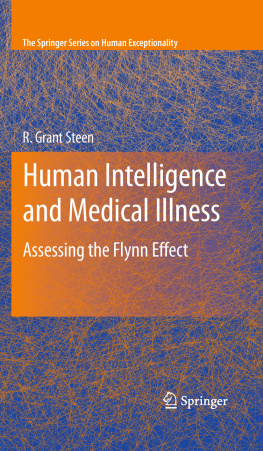R. Grant Steen The Springer Series on Human Exceptionality Human Intelligence and Medical Illness Assessing the Flynn Effect 10.1007/978-1-4419-0092-0_1 Springer Science+Business Media, LLC 2010
1. Are People Getting Smarter?
Abstract
We have gone from solitary computers to a buzzing internet in a few years, from horse-drawn carriages to motor-driven cars in a few generations, from standing on the ground to landing on the moon in a century, from tribes to nations in a millennium, from the law of the jungle to the rule of the law in a few millennia. If one thinks of human culture as a kind of collective intelligence, then it is clear that our collective intelligence is growing very rapidly. The rate of human progress is simply astounding, especially when compared with the rate of cultural change in other creatures widely recognized as intelligent. While we have formed tribes, then kingdoms, then nations, and finally alliances between nations, chimpanzees have continued to live in small family groups. While we have built houses, then towns, then cities, and finally metropolises, dolphins have built nothing tangible at all. While we have learned to speak, then to debate, then to write, and finally to collect writing in libraries, elephants have not progressed past the level of fairly simple vocalizations. While we have made hollowed logs, then violins, and finally symphonies, whales have continued to sing their same simple songs. The rapidity of change in the human culture argues that the brain itself the substrate of our intelligence must also be changing. Yet, there is other and far more direct evidence that the brain is changing; human intelligence appears to be increasing.
We have gone from solitary computers to a buzzing internet in a few years, from horse-drawn carriages to motor-driven cars in a few generations, from standing on the ground to landing on the moon in a century, from tribes to nations in a millennium, from the law of the jungle to the rule of the law in a few millennia. If one thinks of human culture as a kind of collective intelligence, then it is clear that our collective intelligence is growing very rapidly.
The rate of human progress is simply astounding, especially when compared with the rate of cultural change in other creatures widely recognized as intelligent. While we have formed tribes, then kingdoms, then nations, and finally alliances between nations, chimpanzees have continued to live in small family groups. While we have built houses, then towns, then cities, and finally metropolises, dolphins have built nothing tangible at all. While we have learned to speak, then to debate, then to write, and finally to collect writing in libraries, elephants have not progressed past the level of fairly simple vocalizations. While we have made hollowed logs, then violins, and finally symphonies, whales have continued to sing their same simple songs.
The rapidity of change in the human culture argues that the brain itself the substrate of our intelligence must also be changing. Yet, there is other and far more direct evidence that the brain is changing; human intelligence appears to be increasing.
What Is Intelligence?
Intelligence can be hard to define, though most of us can recognize it when we see it. But, what is it that we recognize? The American Heritage Dictionary defines intelligence as, the capacity to acquire and apply knowledge. This definition perhaps places too much weight on acquiring knowledge; computers are far more effective than brains at storing data, yet the storage of data is not intelligence. The ability to apply knowledge is more relevant to what most people would recognize as intelligence, though this definition begs the question: How is knowledge applied? Stedmans Medical Dictionary defines intelligence as the capacity to act purposefully, think rationally, and deal effectively with [the] environment, especially in relation to.meeting challenges. This definition seems more substantive, but it also suggests a simpler and equally substantive definition; intelligence is the ability to solve problems.
If human intelligence is simply the ability to solve problems, then it should be possible to measure intelligence objectively. All that would be necessary is to give large numbers of people the same set of problems, then determine who solved those problems more accurately or more rapidly. This is essentially what modern intelligence tests do; they pose a set of relatively simple problems, often in the context of a stringent time limit, and the answers given to these problems are objectively compared to the answers given by a normative sample of people of the same age. Yet, this seemingly simple approach to intelligence testing is fraught with problems.
All intelligence tests assume some degree of prior knowledge; it is not possible to score well in most tests if you cannot read. But, modern intelligence tests strive to measure aptitude rather than achievement the ability to learn and manipulate new information rather than the ability to recall old information. In other words, intelligence tests strive to gauge an inherent ability to solve new problems, rather than to assess an acquired ability to solve old problems. The logic is, learning the answers to problems in school may make you educated but it does not make you intelligent. The dichotomy between aptitude and achievement is, to some extent, meaningless; no test is completely free of assumed prior knowledge. One cannot exhibit mathematical reasoning unless one has learned the numbers and had some practice with them in the past. Yet intelligence testing strives to be as free as possible from a dependence upon prior knowledge; the era is long past when intelligence might be judged simply by the degree of facility in speaking Latin or Greek.
A difficulty arises when the knowledge base that an intelligence test assumes comprises information that intrinsically favors one test-taker over another, or perhaps favors one culture over another. For example, during World War I, when new immigrants from Italy, Poland, and other parts of Eastern Europe were inducted into the United States Army, the intelligence of these men was evaluated by asking them to recall the nicknames of professional baseball teams []. Those who could not speak English were shown drawings and asked to identify the missing element of the picture. If a new immigrant was unable to identify that the net was missing from a drawing of a tennis court, he was assumed to be intellectually inferior. This is clearly unfair to someone who may have grown up in a culture in which tennis is unknown. Yet it is also true that some degree of cultural bias is inescapable in intelligence testing; culture is as ingrained as language and both are learned. Nevertheless, intelligence tests are designed to predict success in the dominant culture, rather than in an alternate culture, so small amounts of bias may not hinder the ability of a test to predict success in that dominant culture.
The Flynn Effect
Intelligence testing was first undertaken on a large scale by the United States Army during World War I, in an effort to match newly-drafted men with tasks suitable to their skills. Clearly, it would not be appropriate to assign an illiterate man to the officer corps, since an illiterate could neither generate nor respond to written orders. But it would also not be appropriate to put an innumerate man in the artillery corps, since the calculations that enable cannon shells to be fired accurately can be difficult. The Army took up intelligence testing on a large scale to match the man to the mission, to fit the tool to the task.











